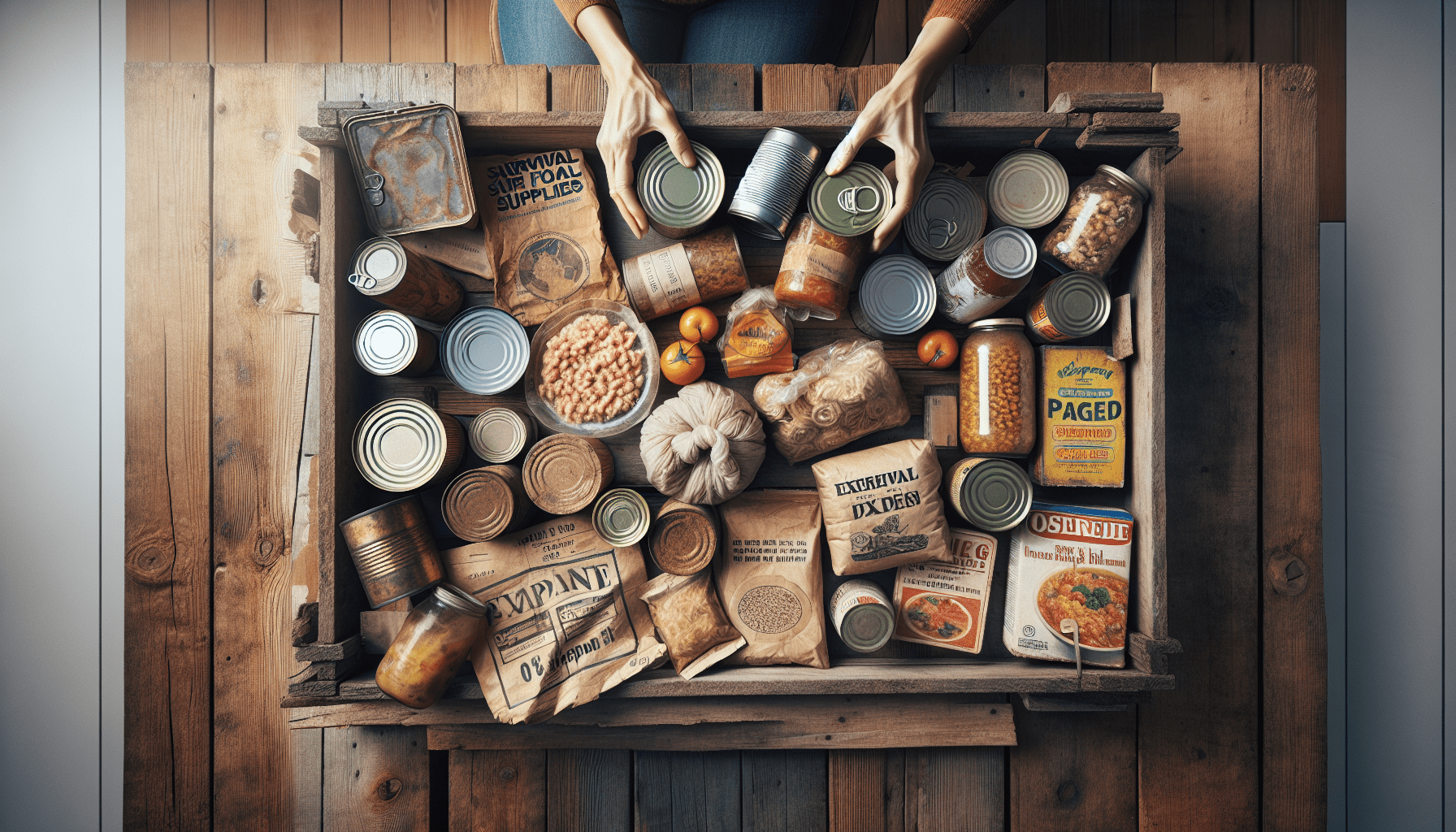Have you ever stumbled upon a forgotten stockpile of emergency food only to realize it’s past its expiration date? It’s a common scenario, especially for those who like to be prepared for unforeseen situations. So, the question arises: What do you do with expired emergency food? Before you decide to discard it, understanding the essence of expiration dates and the implications on food safety is essential. This insight might empower you to make informed decisions regarding your emergency food supplies.

Understanding Expiration Dates
When you notice the expiration date, it’s easy to assume the food is unfit for consumption. However, understanding what those dates actually represent can offer peace of mind and potentially save you from unnecessary waste.
Different Types of Expiration Labels
There are several types of expiration labels you may encounter, each having a distinct meaning:
-
Sell By: This date tells the store how long to display the product for sale. It’s primarily for inventory management rather than consumer use.
-
Best By/Best Before: This indicates when the product will be at its peak quality. It doesn’t mean that the food is unsafe to eat after this date.
-
Use By: This is the manufacturer’s suggestion for when the product is at its best quality. After this date, the quality, not the safety, may begin to degrade.
-
Expiration Date: This is the last date the manufacturer recommends that you consume the product for guaranteed quality and safety.
Does Expired Mean Unsafe?
More often than not, expiration dates are about quality rather than safety. Many foods are perfectly safe to eat post-expiration if they have been stored properly. However, it’s crucial to inspect the food visually and aromatically for any signs of spoilage like mold, off-odors, or discoloration before deciding to consume them.
Evaluating Expired Emergency Food
Your next move after finding those expired items is to carefully evaluate them. A thorough assessment can guide you in deciding whether to keep or toss a product.
Assessing Storage Conditions
Proper storage is the cornerstone of extending the life of your emergency food supplies. Emergency foods stored in a cool, dry, and dark place tend to last much longer than those exposed to heat or light. Consider whether your expired items have been stored in ideal conditions, as this will significantly impact their post-expiration quality.
Conducting a Sensory Evaluation
Before consuming expired food, perform a sensory evaluation:
-
Visual Check: Look for changes in color, texture, or the presence of mold, which can indicate spoilage.
-
Smell Test: If the food emits an unpleasant or rancid odor, it’s best to avoid consuming it.
-
Taste Test: If it passes the first two checks, taste a small amount to assess its quality. If it tastes off, spit it out and consider it unsafe.
The Importance of Packaging
The packaging of your emergency food plays a significant role in its longevity. Airtight, vacuum-sealed, or canned goods have a better chance of being safe after the expiration date compared to perishable or inadequately packaged foods.

Deciding What to Do with Expired Emergency Food
After examining your expired supplies, it’s time to decide their fate. Informed decisions can help minimize waste while maximizing safety.
Consuming Safe Expired Food
If your sensory evaluation convinces you of the food’s safety, consuming it could be a feasible option. Products with preservatives or those vacuum-sealed often remain safe for much longer periods. However, ensure that your use of such items is expedient to prevent further quality degradation.
Utilizing as Animal Feed
Certain expired foods can be repurposed as animal feed. Non-spoiled grains, for example, can be fed to livestock after confirming their safety. However, avoid giving animals spoiled, moldy, or chemically altered foods that could endanger their health.
Composting Spoiled Items
When food is clearly unfit for consumption by humans or animals, you might consider composting. Check whether the expired items are suitable for composting—fruits, vegetables, and grains often are. Composting allows you to turn waste into nutrient-rich soil amendments for your garden, completing the cycle in an environmentally-friendly manner.
Disposing Safely
Certain foods might not have viable alternative uses and must be discarded. Practice responsible disposal methods by checking local guidelines for food waste. Many communities support composting or bio-digester projects to minimize landfill contributions.

Maintaining Your Emergency Food Supply
The discovery of expired food should serve as a reminder to regularly maintain and rotate your emergency supplies.
Regular Inventory Checks
Perform regular inventory checks to monitor expiration dates, ensuring a longer usable life for your supplies. This consistency can help create a more effective system for food usage that minimizes waste.
First-In, First-Out (FIFO) System
Implement a First-In, First-Out (FIFO) approach to managing your stock. Store newly-purchased items at the back of the stockpile while moving older items to the front. This straightforward method helps ensure that older items are used before they expire.
Proper Storage Practices
Continuously practice proper storage methods to extend food longevity. This includes maintaining a cool, dry, and dark environment, ensuring airtight seals, and utilizing moisture absorbers in areas prone to humidity.

Planning Your Future Emergency Preparedness
The insights gained from your expired food experience can enhance your future emergency preparedness.
Smarter Purchasing Decisions
When replenishing your emergency food, opt for items with longer shelf lives and consider variety. Include freeze-dried, dehydrated, or canned items that boast extended expiration periods. Pay attention to packaging integrity and opt for products with chemical preservatives that enhance longevity safely.
Knowledge of Shelf-Stable Options
Educate yourself on shelf-stable options, including non-perishable staples like rice, beans, pasta, and canned goods. Knowing which items provide the longest shelf life enables wiser consumption and stocking strategies.
Sustainable Practices
Consider sustainability as you prepare for emergencies. Many companies offer eco-friendly packaging and organic options that align with ethical consumption choices. Buying in bulk can reduce packaging waste, and choosing plant-based selections can lower your carbon footprint.
Emergency Food Preparation Skills
Acquiring skills in food preservation, such as canning and dehydrating, allows you to create your own emergency supplies. These skills ensure you have nutritional control over your stockpile and enable persistent replenishment without relying solely on commercial products.

Wrapping Up the Expired Emergency Food Dilemma
Reassessing what to do with expired emergency food offers you a perfect opportunity to be mindful of safety and sustainability. Thoroughly evaluating expired items allows you to use or responsibly dispose of them while learning valuable lessons in preparedness. Your actions today will ensure better food management practices that not only safeguard your well-being but also emphasize resource efficiency for the future.
Ultimately, your journey of managing expired emergency food should inspire responsible consumption and proactive preparedness planning, leading to peace of mind and readiness, one meal at a time.

